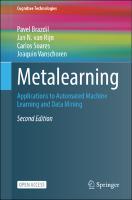Metalearning
Applications to Automated Machine Learning and Data Mining
Author(s)
Brazdil, Pavel
van Rijn, Jan N.
Soares, Carlos
Vanschoren, Joaquin
Collection
Dutch Research Council (NWO)Language
EnglishAbstract
This open access book as one of the fastest-growing areas of research in machine learning, metalearning studies principled methods to obtain efficient models and solutions by adapting machine learning and data mining processes. This adaptation usually exploits information from past experience on other tasks and the adaptive processes can involve machine learning approaches. As a related area to metalearning and a hot topic currently, automated machine learning (AutoML) is concerned with automating the machine learning processes. Metalearning and AutoML can help AI learn to control the application of different learning methods and acquire new solutions faster without unnecessary interventions from the user. This book offers a comprehensive and thorough introduction to almost all aspects of metalearning and AutoML, covering the basic concepts and architecture, evaluation, datasets, hyperparameter optimization, ensembles and workflows, and also how this knowledge can be used to select, combine, compose, adapt and configure both algorithms and models to yield faster and better solutions to data mining and data science problems. It can thus help developers to develop systems that can improve themselves through experience. This book is a substantial update of the first edition published in 2009. It includes 18 chapters, more than twice as much as the previous version. This enabled the authors to cover the most relevant topics in more depth and incorporate the overview of recent research in the respective area. The book will be of interest to researchers and graduate students in the areas of machine learning, data mining, data science and artificial intelligence. ; Metalearning is the study of principled methods that exploit metaknowledge to obtain efficient models and solutions by adapting machine learning and data mining processes. While the variety of machine learning and data mining techniques now available can, in principle, provide good model solutions, a methodology is still needed to guide the search for the most appropriate model in an efficient way. Metalearning provides one such methodology that allows systems to become more effective through experience. This book discusses several approaches to obtaining knowledge concerning the performance of machine learning and data mining algorithms. It shows how this knowledge can be reused to select, combine, compose and adapt both algorithms and models to yield faster, more effective solutions to data mining problems. It can thus help developers improve their algorithms and also develop learning systems that can improve themselves. The book will be of interest to researchers and graduate students in the areas of machine learning, data mining and artificial intelligence.
Keywords
Metalearning; Automating Machine Learning (AutoML); Machine Learning; Artificial Intelligence; algorithm selection; algorithm recommendation; algorithm configuration; hyperparameter optimization; automating the workflow/pipeline design; metalearning in ensemble construction; metalearning in deep neural networks; transfer learning; algorithm recommendation for data streams; automating data science; Open AccessDOI
10.1007/978-3-030-67024-5ISBN
9783030670245, 9783030670245Publisher
Springer NaturePublisher website
https://www.springernature.com/gp/products/booksPublication date and place
Cham, 2022Imprint
SpringerSeries
Cognitive Technologies,Classification
Artificial intelligence
Data mining
Machine learning


 Download
Download Web Shop
Web Shop